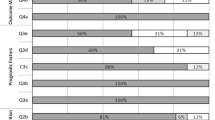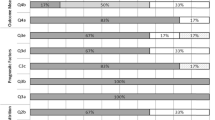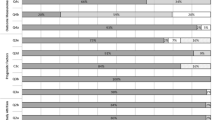Abstract
The use of B-type natriuretic peptides to predict outcomes in general populations has been investigated in a number of primary studies. A previous systematic review considering natriuretic peptides in cardiovascular disease included a subgroup of general population studies, which suggested an association with a number of clinical outcomes. We electronically searched Medline, Embase, AMED, Cochrane Central Register of Controlled Trials, Cochrane Database of Systematic Reviews, and CINAHL for English-language articles published between 1989 and mid-2012. We utilized trained reviewers and standardized forms to screen articles for inclusion and extract data from included articles. All included studies (n = 7) were summarized in narrative and tabular form. A general population was defined as one that was randomly selected from a community setting where no specific inclusion or exclusion criteria were specified. The seven included studies all used FDA approved assays for NT-proBNP. The range of clinical outcomes and heterogeneity did not allow for meta-analysis. The hazard ratios for predicting outcomes in the included studies ranged from 1.0 to 4.1 (all p values <0.05). The discrimination statistics reported in four studies all demonstrated statistically significant improvements in predicting outcomes. NT-proBNP is associated with heart failure, all-cause and cardiovascular mortality, and other combined cardiovascular events in a general unselected population. The discrimination statistics suggest modest improvements in risk stratification. No prospective studies exist to demonstrate the clinical utility of using B-type natriuretic peptides to predict clinical outcomes in a general population.

Similar content being viewed by others
References
Greenland P, Alpert JS, Beller GA, Benjamin EJ, Budoff MJ, Fayad ZA et al (2010) 2010 ACCF/AHA guideline for assessment of cardiovascular risk in asymptomatic adults. J Am Coll Cardiol 56:e50–e103. doi:10.1016/j.jacc.2010.09.001
Daniels LB, Laughlin GA, Clopton P, Maisel AS, Barrett-Connor E (2008) Minimally elevated cardiac troponin T and elevated N-terminal pro-B-type natriuretic peptide predict mortality in older adults: results from the Rancho Bernardo Study. J Am Coll Cardiol 52:450–459. doi:10.1016/j.jacc.2008.04.033
Zethelius B, Berglund L, Sundström J, Ingelsson E, Basu S, Larsson A et al (2008) Use of multiple biomarkers to improve the prediction of death from cardiovascular causes. N Engl J Med 358:2107–2116. doi:10.1056/NEJMoa0707064
Melander O, Newton-Cheh C, Almgren P, Hedblad B, Berglund G, Engstrom G et al (2009) Novel and conventional biomarkers for prediction of incident cardiovascular events in the community. JAMA 302:49–57. doi:10.1001/jama.2009.943
Blankenberg S, Zeller T, Saarela O, Havulinna AS, Kee F, Tunstall-Pedoe H et al (2010) Contribution of 30 biomarkers to 10-year cardiovascular risk estimation in 2 population cohorts: the MONICA, risk, genetics, archiving, and monograph (MORGAM) biomarker project. Circulation 121:2388–2397. doi:10.1161/CIRCULATIONAHA.109.901413
Olsen MH, Hansen TW, Christensen MK, Gustafsson F, Rasmussen S, Wachtell K et al (2007) N-terminal pro-brain natriuretic peptide, but not high sensitivity C-reactive protein, improves cardiovascular risk prediction in the general population. Eur Heart J 28:1374–1381. doi:10.1093/eurheartj/ehl448
Di Angelantonio E, Chowdhury R, Sarwar N, Ray KK, Gobin R, Saleheen D et al (2009) B-type natriuretic peptides and cardiovascular risk: systematic review and meta-analysis of 40 prospective studies. Circ Cardiovasc Qual Outcomes 120:2177–2187. doi:10.1161/CIRCULATIONAHA.109.884866
Balion C, Don-Wauchope A, Hill S, Santaguida PL, Booth R, Brown JA, Oremus M, Ali U, Bustamam A, Sohel N, McKelvie R, Raina P (2013) Use of natriuretic peptide measurement in the management of heart failure. Comparative Effectiveness Reviews, No. 126. 2013. AHRQ Publication No. 13(14)-EHC118-EF. www.effectivehealthcare.ahrq.gov/reports/final.cfm
Alehagen U, Dahlström U, Rehfeld JF, Goetze JP (2011) Association of copeptin and N-terminal proBNP concentrations with risk of cardiovascular death in older patients with symptoms of heart failure. JAMA 305:2088–2095. doi:10.1001/jama.2011.666
Olsen MH, Hansen TW, Christensen MK, Gustafsson F, Rasmussen S, Wachtell K et al (2008) Cardiovascular risk prediction by N-terminal pro brain natriuretic peptide and high sensitivity C-reactive protein is affected by age and sex. J Hypertens 26:26–34. doi:10.1097/HJH.0b013e3282f18301
Linssen GC, Bakker SJ, Voors AA, Gansevoort RT, Hillege HL, de Jong PE et al (2010) N-terminal pro-B-type natriuretic peptide is an independent predictor of cardiovascular morbidity and mortality in the general population. Eur Heart J 31:120–127. doi:10.1093/eurheartj/ehp420
van Hateren KJ, Alkhalaf A, Kleefstra N, Groenier KH, de Jong PE, de Zeeuw D et al (2012) Comparison of midregional pro-A-type natriuretic peptide and the N-terminal pro-B-type natriuretic peptide for predicting mortality and cardiovascular events. Clin Chem 58:293–297. doi:10.1373/clinchem.2011.166348
Hayden JA, Côté P, Bombardier C (2006) Evaluation of the quality of prognosis studies in systematic reviews. Ann Intern Med 144:427–437. doi:10.7326/0003-4819-144-6-200603210-00010
Chisalita SI, Dahlström U, Arnqvist HJ, Alehagen U (2011) Increased IGF1 levels in relation to heart failure and cardiovascular mortality in an elderly population: impact of ACE inhibitors. Eur J Endocrinol 165:891–898. doi:10.1530/EJE-11-0584
Patton KK, Sotoodehnia N, deFilippi C, Siscovick DS, Gottdiener JS, Kronmal RA (2011) N-terminal pro-B-type natriuretic peptide is associated with sudden cardiac death risk: the Cardiovascular Health Study. Heart Rhythm 8:228–233. doi:10.1016/j.hrthm.2010.10.038
Smith JG, Newton-Cheh C, Almgren P, Struck J, Morgenthaler NG, Bergmann A et al (2010) Assessment of conventional cardiovascular risk factors and multiple biomarkers for the prediction of incident heart failure and atrial fibrillation. J Am Coll Cardiol 56:1712–1719. doi:10.1016/j.jacc.2010.05.049
Vaes B, de Ruijter W, Degryse J, Westendorp RG, Gussekloo J (2009) Clinical relevance of a raised plasma N-terminal pro-brain natriuretic peptide level in a population-based cohort of nonagenarians. J Am Geriatr Soc 57:823–829. doi:10.1111/j.1532-5415.2009.02218.x
Yancy CW, Jessup M, Bozkurt B, Butler J, Casey DE Jr, Drazner MH et al (2013) 2013 ACCF/AHA guideline for the management of heart failure: a report of the American College of Cardiology Foundation/American Heart Association Task Force on Practice Guidelines. J Am Coll Cardiol 62:e147–e239. doi:10.1016/j.jacc.2013.05.019
Schmitter D, Cotter G, Voors AA (2014) Clinical use of novel biomarkers in heart failure: towards personalized medicine. Heart Fail Rev 19:369–381. doi:10.1007/s10741-013-9396-5
Metra M, Ponikowski P, Dickstein K, McMurray JJV, Gavazzi A, Bergh C-H et al (2007) Advanced chronic heart failure: a position statement from the Study Group on Advanced Heart Failure of the Heart Failure Association of the European Society of Cardiology. Eur J Heart Fail 9:684–694. doi:10.1016/j.ejheart.2007.04.003
Arcopinto M, Bobbio E, Bossone E, Perrone-Filardi P, Napoli R, Sacca L et al (2013) The GH/IGF-1 axis in chronic heart failure. Endocr Metab Immune Disord Drug Targets 13:76–91
Hlatky MA, Greenland P, Arnett DK, Ballantyne CM, Criqui MH, Elkind MS et al (2009) Criteria for evaluation of novel markers of cardiovascular risk: a scientific statement from the American Heart Association. Circ Cardiovasc Qual Outcomes 119:2408–2416. doi:10.1161/CIRCULATIONAHA.109.192278
Payne RA (2012) Cardiovascular risk. Br J Clin Pharmacol 74:396–410. doi:10.1111/j.1365-2125.2012.04219.x
Rosenberg J, Schou M, Gustafsson F, Badskjaer J, Hildebrandt P (2009) Prognostic threshold levels of NT-proBNP testing in primary care. Eur Heart J 30:66–73. doi:10.1093/eurheartj/ehn525
Acknowledgments
This manuscript is based on research conducted by the McMaster Evidence-based Practice Center (EPC) under contract to the Agency for Healthcare Research and Quality (AHRQ), Rockville, MD (Contract No. HHSA 290 2007-10060-I). The findings and conclusions in this paper are those of the authors, who are responsible for its content, and do not necessarily represent the views of the Agency for Healthcare Research and Quality. No statement herein should be construed as an official position of the Agency for Healthcare Research and Quality or of the U.S. Department of Health and Human Services. Parminder Raina holds a Tier 1 Canada Research Chair in Geroscience and the Raymond and Margaret Labarge Chair in Research and Knowledge Application for Optimal Aging.
Conflict of interest
Mark Oremus, Robert McKelvie, Pasqualina L. Santaguida, Usman Ali, Cynthia Balion, Stephen A. Hill, Judy A. Brown, Amy Bustamam, Nazmul Sohel, and Parminder Raina have no conflicts of interest or financial ties to disclose. Andrew C. Don-Wauchope has received clinical trial support from AMGEN. Ronald A. Booth has received honoraria from INOVA Diagnostics Inc. and is a member of the Health Technology Expert Review Panel of the Canadian Agency for Drugs and Technologies in Health (CADTH).
Author information
Authors and Affiliations
Corresponding author
Rights and permissions
About this article
Cite this article
Don-Wauchope, A.C., Santaguida, P.L., McKelvie, R. et al. Prediction of clinical outcomes using B-type natriuretic peptides in the general population: a systematic review. Heart Fail Rev 19, 541–551 (2014). https://doi.org/10.1007/s10741-014-9446-7
Published:
Issue Date:
DOI: https://doi.org/10.1007/s10741-014-9446-7




